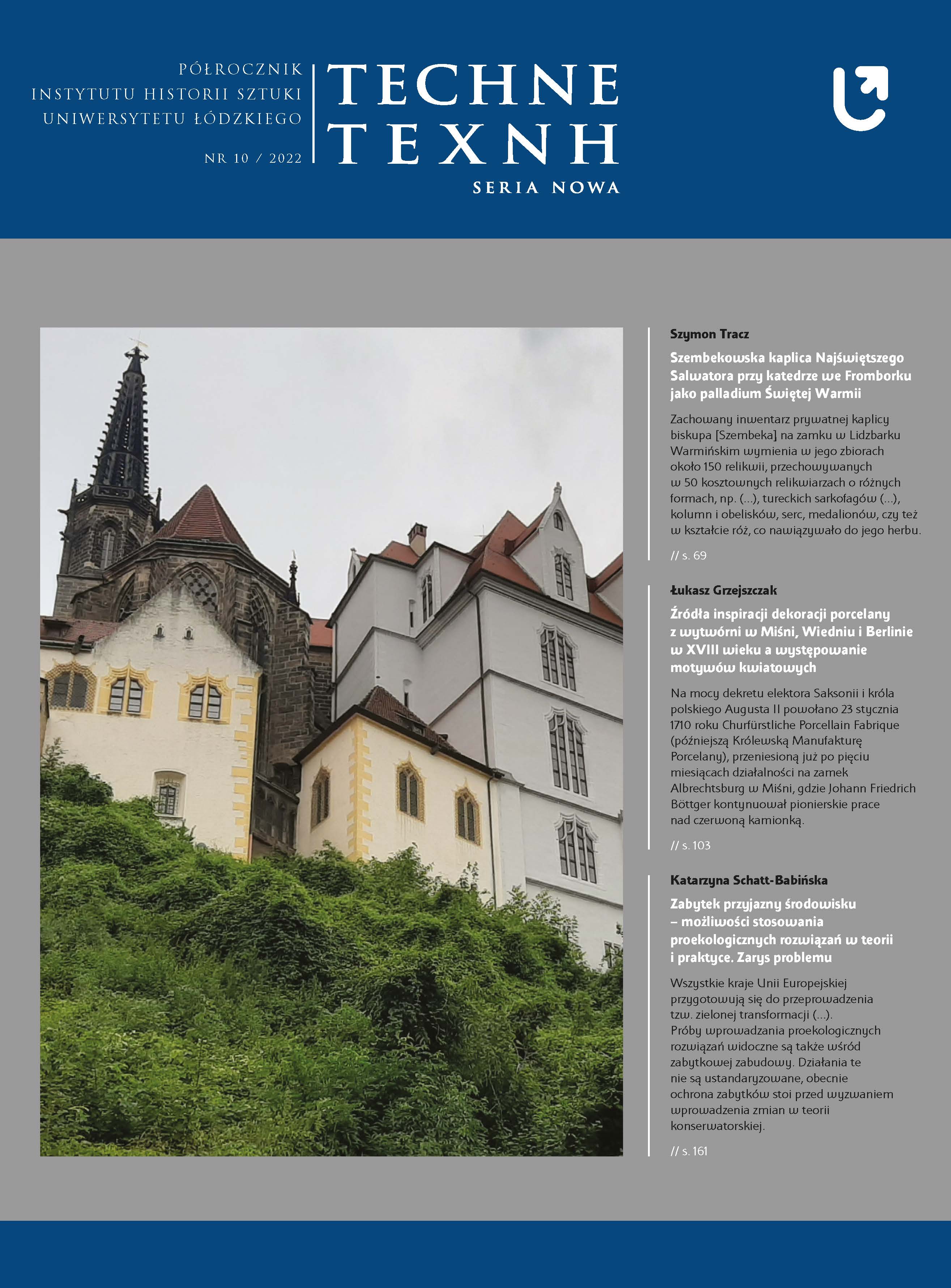An environmentally friendly monument - possibilities of using pro-ecological solutions in theory and practice. Outline of the problem
DOI:
https://doi.org/10.18778/2084-851X.14.07Keywords:
environmental protection, monument protection, ecologyAbstract
The problem of climate change and the effects it may cause has resulted in European Union inducing top-down planning of practical measures to prevent these changes. Attempts to introduce pro-ecological solutions are also visible among the historic buildings. These activities are not standardised, and currently the protection of monuments faces the challenge of introducing changes in the theory of conservation. An opportunity to standardize pro-ecological solutions used within historic buildings is the project of standards for conservation procedures prepared by the National Heritage Board of Poland, including the issuance of permits for photovoltaic installations in historic buildings, in their surroundings and in protected areas.
This article answers the questions: is it possible to protect the climate by protecting monuments, or are the issues of generating renewable energy and the protection of historic buildings treated as equal social interests in accordance to the sustainable development policy? In order to answer these questions, it is necessary to first analyze the applicable law and determine to what extent the conservation theory allows the use of pro-ecological solutions in historic buildings. The analysis of legal provisions and jurisprudence is complemented by the presentation of the results of interviews with architects offering design services in historic buildings (seven persons) and officials of the Voivodship Office for the Protection of Monuments in Łódź (three persons).
It should be borne in mind that historic properties are a part of special cultural resource that should be taken care of. Taking care of the environment in the context of climate change is equally important, but planning pro-ecological activities cannot be put in opposition to the preservation of cultural heritage.
References
Ustawa 1994 – Ustawa z dnia 7 lipca 1994 roku prawo budowlane (Dz. U. z 2022 r. poz. 1557, ze zm.).
Google Scholar
Ustawa 2003A – Ustawa z dnia 23 marca 2003 roku o planowaniu i zagospodarowaniu przestrzennym (Dz. U. z 2022 r. poz. 503).
Google Scholar
Ustawa 2003B – Ustawa z dnia 23 kwietnia 2003 roku o opiece i ochronie zabytków (Dz. U. z 2022 r. poz. 840).
Google Scholar
Ustawa 2015 – Ustawa z dnia 20 lutego 2015 r. o odnawialnych źródłach energii (Dz. U. z 2022 r. poz. 1566, ze zm.).
Google Scholar
II SA/Gd 687/20 – Wyrok Wojewódzkiego Sądu Administracyjnego w Gdańsku z dnia 5 maja 2021 roku, nr II SA/Gd 687/20, LEX nr 3181298.
Google Scholar
II OSK 1281/16 – Wyrok Naczelnego Sądu Administracyjnego z dnia 14 marca 2018 r., nr II OSK 1281/16, LEX nr 2469106.
Google Scholar
VII SA/Wa 2453/17 – Wyrok Wojewódzkiego Sądu Administracyjnego w Warszawie z dnia 10 lipca 2018 r., nr VII SA/Wa 2453/17 LEX nr 3011638.
Google Scholar
Adaptacja do zmian klimatu 2021 – Adaptacja do zmian klimatu w unijnej i polskiej polityce klimatycznej oraz prawie klimatycznym. Wybrane zagadnienia, red. Agnieszka Borek, Warszawa 2021.
Google Scholar
BŁOCH 2018 – Marcel Błoch, Zmiany klimatu jako czynnik warunkujący transformację przyszłych stosunków międzynarodowych, „Annales – Philosophy and Sociology” 2018, t. XLIII, s. 215–231.
Google Scholar
DOI: https://doi.org/10.17951/i.2018.43.1.215-231
BOMBAŁA 2018 – Bronisław Bombała, Kwestia paradygmatu w naukach o zarządzaniu a Kenetha D. Stranga model badania organizacji, „Zagadnienia Naukoznawstwa” 2018, nr 1–4.
Google Scholar
DOI: https://doi.org/10.21852/sem.2018.4.10
Decyzja WUOZ nr 1.5174.89.2015 – Archiwum WUOZ w Przemyślu, Decyzja WUOZ nr 1.5174. 89.2015 z dn. 20.10.2015 r.
Google Scholar
European Green Deal – European Green Deal, https://ec.europa.eu/info/strategy/priorities-2019-2024/european-green-deal/#documents [dostęp: 04.09.2022].
Google Scholar
GEERTZ 2006 – Clifford Geertz C., Interpretacja kultur. Wybrane eseje, Kraków 2006.
Google Scholar
Green Long Strategy – Green Long Strategy, https://unfccc.int/documents/210328 [dostęp: 04.09. 2022].
Google Scholar
IPCC Report – IPCC Full Report, https://report.ipcc.ch/ar6wg2/pdf/IPCC_AR6_WGII_FinalDraft_FullReport.pdf [dostęp: 04.09.2022].
Google Scholar
Kolektory słoneczne na zabytkach – Kolektory słoneczne na zabytkach, https://wuoz.bialystok.pl/kolektory-sloneczne-na-zabytkach/ [dostęp: 04.09.2022].
Google Scholar
KOWALSKA 2018 – Ewelina Kowalska, Własność zabytku a dyskrecjonalna władza konserwatorska, Gdańsk 2018.
Google Scholar
Krajowy Plan Działań 2017 – Krajowy Plan Działań dotyczący efektywności energetycznej dla Polski 2017, https://www.gov.pl/web/klimat/krajowy-plan-dzialan-dotyczacy-efektywnosci-energetycznej [dostęp: 04.09.2022].
Google Scholar
Krajowy plan na rzecz energii i klimatu – Krajowy plan na rzecz energii i klimatu, https://www.gov.pl/web/klimat/krajowy-plan-na-rzecz-energii-i-klimatu [dostęp: 04.09.2022].
Google Scholar
MASLIN 2021 – Mark Maslin, Zmiany klimatu, Łódź 2018.
Google Scholar
PAŁUBSKA/ZALASIŃSKA 2021 – Katarzyna Pałubska, Katarzyna Zalasińska, Najnowsze dokumenty strategiczne określające zmiany w podejściu do modernizacji zabytków w Polsce, „Ochrona Dziedzictwa Kulturowego” 2021, nr 11, s. 127–142.
Google Scholar
DOI: https://doi.org/10.35784/odk.2811
Paris agreement – Paris agreement, https://ec.europa.eu/clima/eu-action/international-action-climate-change/climate-negotiations/paris-agreement_pl [dostęp: 04.09.2022].
Google Scholar
SCHATT-BABIŃSKA 2020A – Katarzyna Schatt-Babińska, Assessment of the monument protection system: The need for research in the constructivist-interpretative paradigm, „Gdańskie Studia Międzynarodowe” 2020, t. 18, nr 1–2, s. 147–159.
Google Scholar
SCHATT-BABIŃSKA 2020B – Katarzyna Schatt-Babińska, Zabytki nieruchome w rękach prywatnych – historia, zagadnienia ochrony i konserwacji na przykładach obiektów wpisanych do rejestru zabytków w Łodzi, praca doktorska napisana pod kierunkiem prof. Krzysztofa Stefańskiego, obrona doktorska: 16 stycznia 2020, Uniwersytet Łódzki, Wydział Filozoficzno-Historyczny.
Google Scholar
SUŁKOWSKI 2007 – Łukasz Sułkowski, Recepcja nurtu interpretatywnego w naukach o zarządzaniu, s. 22–30, https://ruj.uj.edu.pl/xmlui/bitstream/handle/item/85295/sulkowski_recepcja_nurtu_interpretatywnego_2007.pdf?sequence=1&isAllowed=y [dostęp: 04.09.2022].
Google Scholar
Wytyczne 2020 – Załącznik nr 1 do pisma Generalnego Konserwatora Zabytków o sygnaturze DOZ.070.2.2020.JW z dnia 28 lutego 2020, wytyczne generalnego konserwatora zabytków dotyczące ochrony wartości dziedzictwa kulturowego w procesie poprawy charakterystyki energetycznej budowli zabytkowych https://samorzad.nid.pl/wp-content/uploads/2021/08/Zal.-nr-1-Wytyczne-Generalnego-Konserwatora-Zabytkow-dotyczace-ochrony-wartosci-dziedzictwa-kulturowego-w-procesie-poprawy-charakterystyki-energetycznej-budowli-zabytkowych.pdf [dostęp: 04.09.2022].
Google Scholar
Zmiana klimatu 2020 – Zmiana klimatu – skutki dla polskiego społeczeństwa i gospodarki, red. Małgorzata Burchard-Dziubińskaj, Konrad Prandecki, Warszawa 2020.
Google Scholar
Zogniskowany wywiad 2016 – Zogniskowany wywiad grupowy jako metoda badania prawa ochrony zabytków, red. Alicja Jagielska-Burduk, Wojciech Szafrański, Piotr Lasik, Bydgoszcz 2016.
Google Scholar
Downloads
Published
How to Cite
Issue
Section
License

This work is licensed under a Creative Commons Attribution-NonCommercial-NoDerivatives 4.0 International License.








